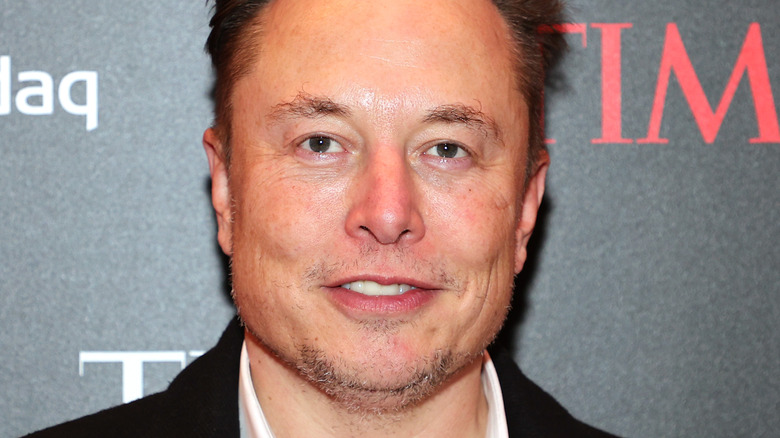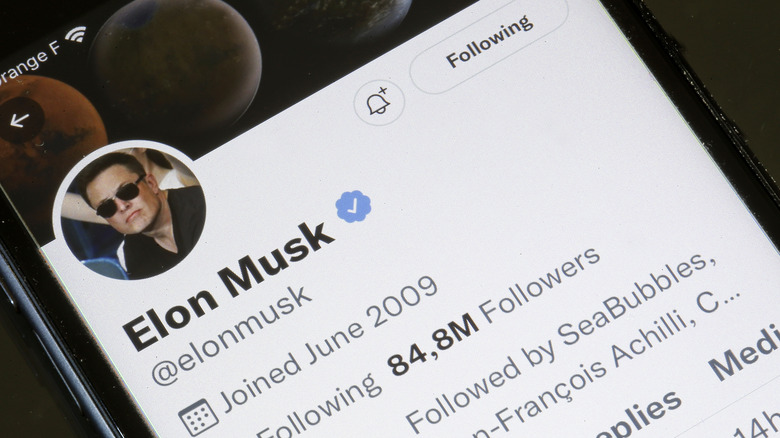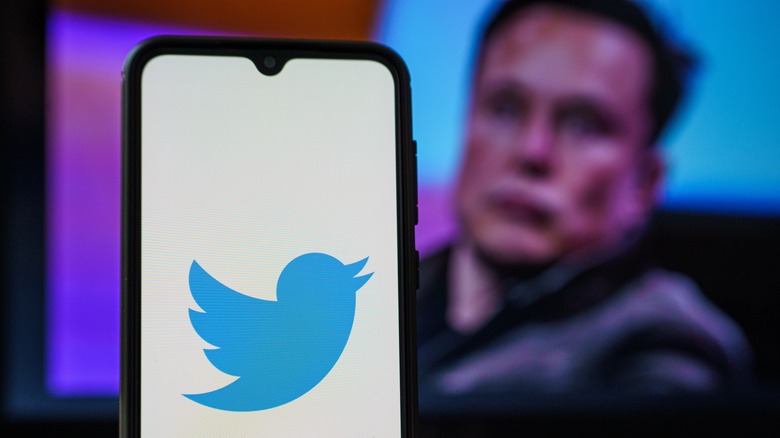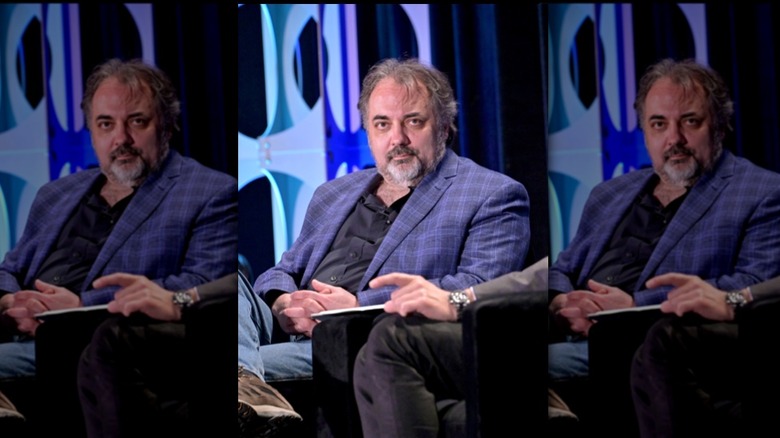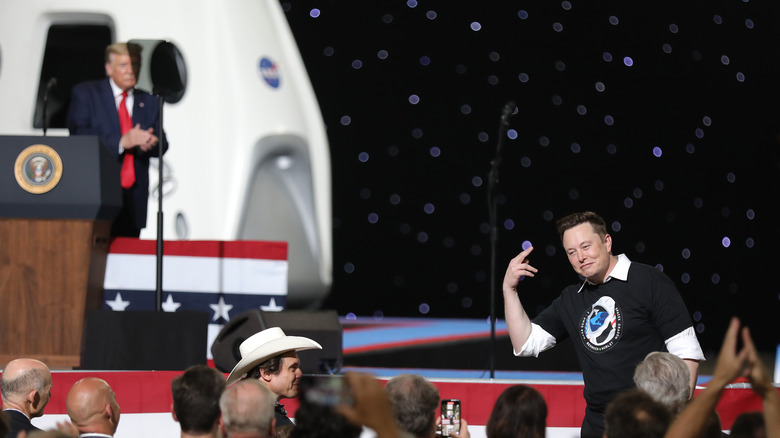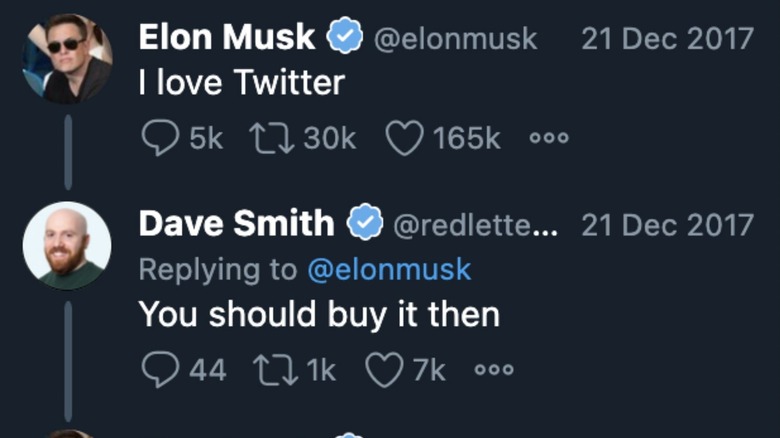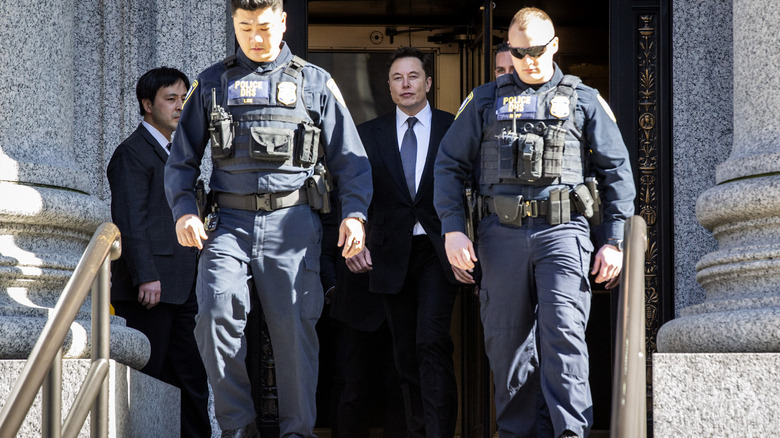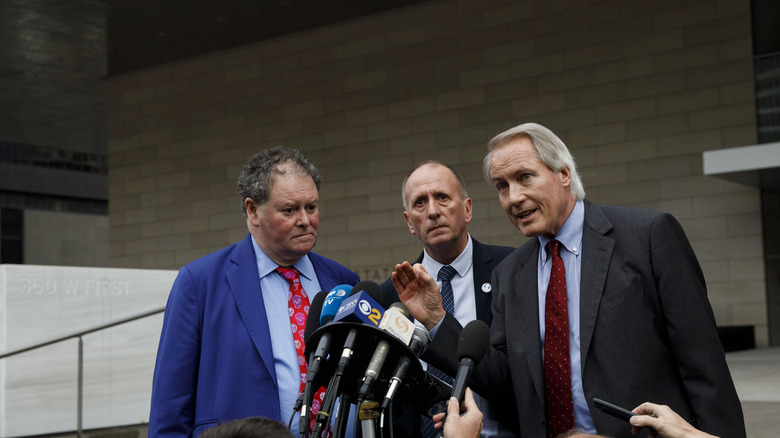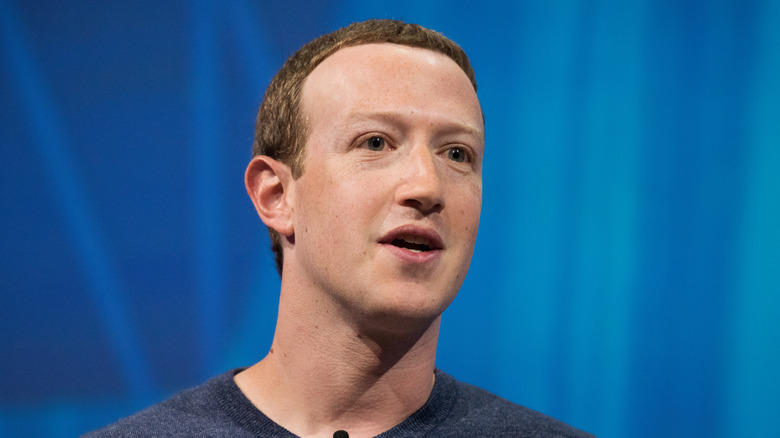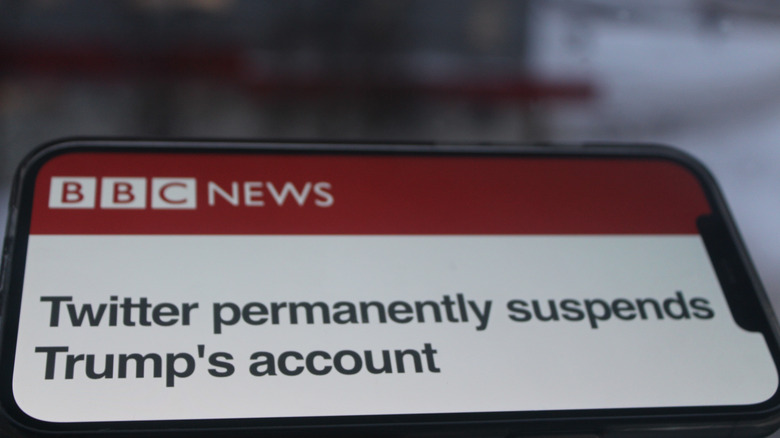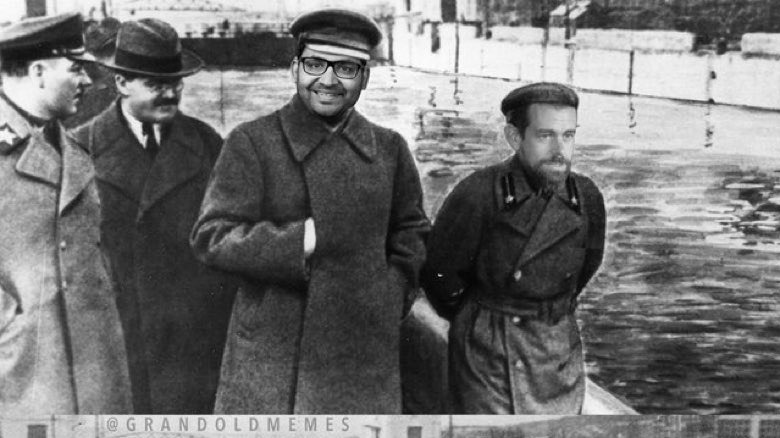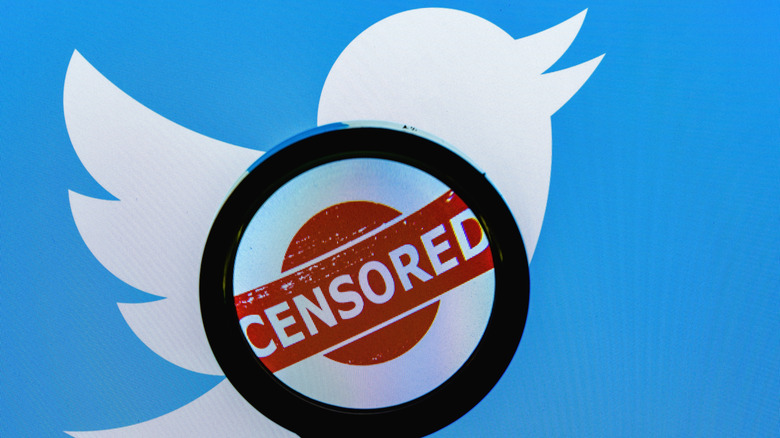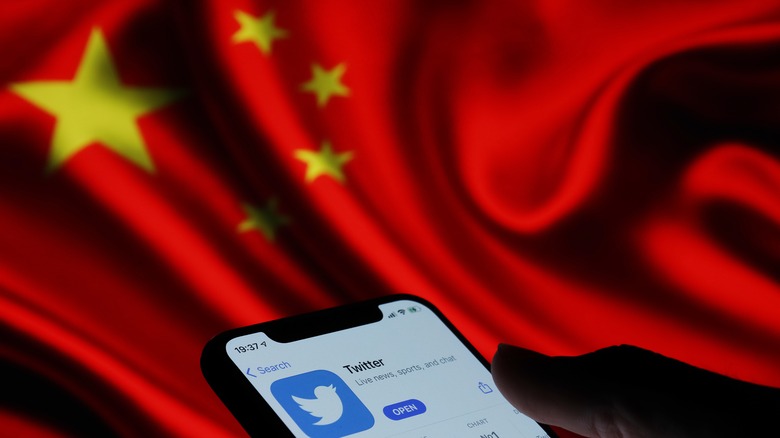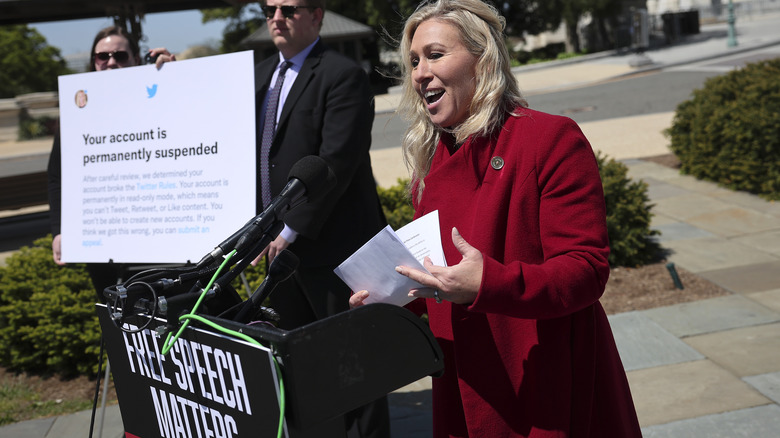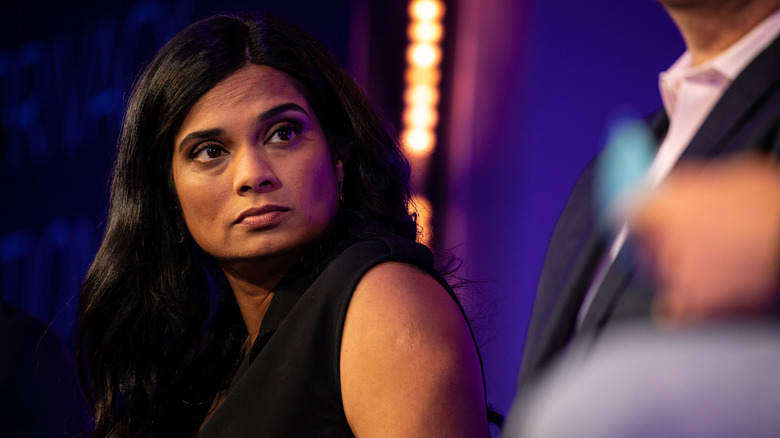Elon Musk's Long History Of Criticizing Twitter
Tesla CEO Elon Musk has made international headlines following his $44 billion purchase of the social media platform Twitter, pledging to make the platform politically neutral. According to the Guardian, his purchase of the platform has Republicans and Trump supporters celebrating and Democrats and sections of the media leaving the platform in droves. But none of this is really surprising. As University of Michigan professor Adam Pritchard notes (via Wired), Musk has been hinting at buying Twitter for years, something that can easily be missed because his buyout came so quickly and suddenly.
Musk has generally used Twitter to troll, meme, and argue with his detractors, as well as to promote his products and engage with Tesla investors and customers. His tweets have led to defamation and SEC lawsuits and, more than once, he has tweeted both praise and hate for the platform. He even claimed that he had deleted his Twitter account once -– on Twitter — and then changed his name to "daddydotcom" (via CNBC). So what will the new Twitter look like? A brief history of Musk's engagement with the platform suggests that it may become more of an internet Wild West than the moderated platform it was before he bought it.
The beginning
Elon Musk's relationship with Twitter began in 2009 when, according to ABC News, he joined the platform. Only it wasn't really him. A since-deleted account claiming to be the "real Elon Musk" began tweeting controversial political viewpoints under Musk's name. SpaceX then put out a tweet denying Musk's Twitter presence. Musk himself confirmed that in 2010 when his first-ever tweet to his fans said to ignore the 2009 tweets because they were not his.
Since he had to tweet in order for fans to ignore the impersonator account, it was clear that Twitter had an issue with fake accounts – an issue that risked landing the platform in legal problems. According to The Guardian, St. Louis Cardinals manager Tony La Russa complained of his name being used without his permission on the platform. So Twitter introduced the blue checkmark to differentiate anonymous accounts from verified public figures – such as La Russa or Musk – thus solving the problem. Since then, as Al-Jazeera notes, Musk's Twitter engagement steadily grew until it ballooned in 2015.
Elon Musk didn't tweet much for years
As Al-Jazeera notes, Elon Musk was not a particularly prolific tweeter. In fact, in his first two years on the platform, he barely tweeted at all. In an analysis of his tweets, the Visual Capitalist noted that Musk mostly tweeted news about his SpaceX ventures. As time went on, he began to talk more about Tesla, PayPal, and his StarLink system.
As can be seen from his early tweets, he had relatively few followers and few seemed to care much about him. His early tweets rarely averaged more than a few hundred likes or retweets, and given that he did not use the platform much, this should come as no surprise. But he also did not enjoy the fame he has today. His tweeting did not really increase much until 2015, when his juvenile and trollish brand of humor began to manifest publicly.
The opening salvo?
According to Fortune, Elon Musk's company Tesla landed in hot water after he and other Tesla shareholders dumped over $2 billion in stock after a Tesla self-driving car killed a Florida man named Joshua Brown in 2016. Musk never said anything publically about the crash before selling his stock, suggesting that he was rushing to beat other sellers before word of the incident spread and caused a sell-off. The self-driving car controversy, however, soon spilled onto Twitter where Musk fired what might have been an opening salvo at the platform.
The debate about Tesla's autopilot feature soon made it to Twitter after Musk claimed that the system, despite failures, could save over half a million lives. So Forbes writer Sam Abuelsamid (pictured) tweeted at Musk telling him to check his math. Musk responded claiming that the self-driving cars would prevent non-occupant deaths in car accidents, which he claimed Abuelsamid had omitted from his analysis. He then tweeted "I love Twitter." It could either be that he loved the platform as a forum for discussion or he was being sarcastic and mocking Abuelsamid's use of the platform to call him out. Either way, it was a harbinger of the billionaire's love-hate relationship with Twitter that led to the buyout.
The first open criticism
Elon Musk made his first clear-cut criticism of Twitter in 2017. He tweeted that Twitter was a "haters' hellscape" after urging Americans to be grateful for their legal system, which despite its flaws, was superior to most around the world.
According to GeekWire, the context of the tweet – and the tweetstorm that followed – was political. Musk opposed President Donald Trump's 7-country travel ban. According to CNN Money, he directly conveyed his criticism to the president during an advisory council meeting. So when a Seattle judge put a moratorium on the travel ban, Musk tweeted out his appreciation of the judge's decision, claiming that the system had worked as it was supposed to.
The tweet led to a massive tweetstorm in which Trump's detractors attacked Musk for sitting on the president's advisory council in the first place. Musk justified his actions by presenting himself as an apolitical advisor trying to steer the president on the correct course. When one of his supporters tweeted "haters gonna hate," Musk agreed and added that Twitter had become a "haters' hellscape." But it is unclear if Musk was attacking the platform for hosting his detractors or just complaining about his detractors.
I love Twitter!
In 2017, Elon Musk randomly tweeted out "I love Twitter." It did not seem to be in response to anything in particular. Perhaps Musk had begun to enjoy the platform as a place to promote his companies, converse with fans, and duke it out with his critics, but either way, the resulting exchange has become the stuff of legend in light of his buyout.
According to Indian magazine Opoyi (where Musk has a large following), The Insider's Dave Smith and a number of other users responded to Musk's tweet asking him why he wasn't buying Twitter if he liked it so much. Musk responded by asking "how much is it?" along with an upside-down smiley face emoji. As Opoyi notes, everyone thought this was a joke, and knowing Musk's sometimes-juvenile brand of humor, it would have been difficult to see it otherwise at the time. Yet Musk, it appears, was deadly serious – or at least he was as of 2022. Smith tweeted recently that the short conversation "continues to haunt him," while the responses joked/blamed him for giving Musk the idea of buying Twitter in the first place.
Trouble brewing
Elon Musk did not tweet out any new criticisms of Twitter that made the news for a while. Instead, Twitter got him in trouble after Musk decided to have a bit too much fun. Musk tweeted in 2018 that he had secured enough funding to make Tesla a privately-traded company (meaning shares cannot be bought publicly). Shares would go for $420 a pop.
Now, according to The Verge, the tweet was half-serious, half-joke. The $420/share was supposed to be a reference to 4/20, when weed enthusiasts openly smoke and celebrate their use of the drug. In fact, Musk made waves after smoking it on the Joe Rogan Experience. But in an official Tesla email, Musk seemed to be dead serious about the proposal.
Regardless of his intentions, the tweet drew the attention of the SEC, which accused Musk of misleading shareholders with the $420 number. For this reason, Forbes argues it really was a weed joke. The $420 number had no basis otherwise. The SEC slapped him and Tesla with $20 million each in fines. Musk lost his chairmanship while Tesla's stock plunged 13%. Hilariously, although the SEC missed the joke, a number of Twitter users got it, with one responding "blaze up" and two others posting gifs that referenced smoking marijuana. Looking back, Musk told NBC that despite the cost, the whole thing was "worth it" to make his girlfriend laugh.
The banal propaganda barb
Elon Musk's unfiltered tweeting landed him in trouble with the law again in 2019. According to Mashable, when a Thai soccer team got trapped in a cave, Musk offered to help. Vernon Unsworth, the British diver coordinating the rescue, called Musk's offer a PR stunt. Musk, never one to turn down an internet fight, called him "pedo guy" in response.
The story then got crazier. Musk hired a private investigator to dig up dirt on Unsworth and then claimed that "pedo guy" was a South African insult that did not imply Unsworth was actually a pedophile. According to the BBC, Musk issued a not-so-sincere apology to "pedo guy," in which he literally called Unsworth "pedo guy" while simultaneously apologizing for using the insult. He then said that Unsworth deserved it. So Unsworth sued him for defamation and lost (via BBC).
So how did Musk justify such tweets? A year earlier, this tweet suggested that he saw Twitter as a playground. He claimed that his tweets were in-the-moment opinions, not "carefully crafted corporate bs." Thus, Musk argued that his Twitter feed was him thinking out loud – and according to Futurism – on the toilet. Therefore, his tweets were not to be taken too seriously since they are all in good fun. It also seemed like a veiled barb at Twitter, suggesting that Musk did not take the platform as a place for serious discussion – only for banter.
Twitter sucks
Following his legal troubles, Elon Musk continued to use Twitter to post thoughts, memes, and political opinions. Then he got into a spat with Facebook's Mark Zuckerberg after actor Sacha Baron-Cohen accused Facebook of failing to curb "hate speech and propaganda" on its platform.
Musk, being Musk, could not resist the temptation and tweeted at Baron-Cohen in February of 2020 telling the actor and his own followers to delete Facebook because it was lame. He tweeted "Facebook sucks" in May of 2020. Soon, he turned on Twitter as well. Although Wired noted that he had previously expressed love for the platform and respect for its CEO Jack Dorsey, it now also "sucked."
In July of 2020, Musk tweeted out "Twitter sucks” next to a rose emoji. The tweet likely was a knee-jerk reaction to Musk's account possibly being compromised by hackers. As a result of the hack, there was a risk that his personal DMs would be leaked and possibly make him look bad. But since they mostly consisted of memes, he wasn't too worried.
Commenting on the Trump ban
Following the 2020 election, CNet reported that Elon Musk increasingly leveled criticisms at Big Tech over free speech, limits on internet speech, and the power of Big Tech to censor dissenting opinions. Thus, Donald Trump's Twitter ban became part of Musk's cause. Now, as Politico notes, Trump and Musk – despite previous disagreements – are alike in more than a few ways. Both were outspoken in their criticism of the media's coverage of the administration and both have used Twitter as an unfiltered platform to mock their opponents.
This criticism of Big Tech (including Twitter) revolved around a satirical Babylon Bee article about Trump's Twitter ban. Musk tweeted in response to the OP that Silicon Valley was making many enemies among the American public by kicking Trump off Twitter and censoring his political allies and supporters. More importantly, however, he pointed out a problem that resonated with Trump's base – that Silicon Valley's tech elites had become the "de facto artbiter[s] of free speech." Musk then followed up in a response to another user, urging Silicon Valley to make a distinction between "banning hate speech and banning speech it hates." That criticism of Twitter and Big Tech put Musk on the road to taking over the platform.
Likening Parag Agrawal to Stalin
Before making a bid for Twitter, Elon Musk took one last shot. In 2021, CNBC reported that Jack Dorsey would step down as Twitter CEO to be replaced by CTO Parag Agrawal. Now, the announcement lit off a firestorm of controversy, particularly surrounding Agrawal's views on the U.S. Constitution. In an interview with MIT in 2018, Agrawal stated that Twitter's role was to create "a healthy public conversation" and not "be bound by the First Amendment." As the NY Post reported, Agrawal's comments drew criticism from both conservatives and liberals – in particular journalists – who worried that Twitter was effectively positioning itself as an arbiter of acceptable discourse.
Instead of criticizing Agrawal directly, Elon Musk jumped into the debate with an old favorite of his – memes. In early December of 2021, Musk tweeted a meme of Agrawal's face shopped onto Soviet dictator Joseph Stalin's body, while Stalinist lieutenant Nikolai Yezhov got Jack Dorsey's face.
According to Fortune, the original photo showed the two men walking. Once Yezhov was executed, he was doctored out of the photo. Thus, Musk's meme implied that Dorsey, whom critics considered a defender of free speech despite his issues with Trump and the infamous Hunter Biden laptop, had been "executed" by Agrawal, who intended to undo that legacy by clamping down on censorship. Soon after Agrawal's debut as CEO, Musk began to seriously explore buying Twitter.
The days preceding the buyout
In the days preceding the buyout, Elon Musk directed a flurry of criticism towards Twitter while making his case for buying it. In March, Musk referred to himself as a "free speech absolutist." He later issued a poll asking if Twitter was upholding democracy by allowing free speech and then stated his own opinion that it had not only failed to do so, but actively undermined it. Now that he has actually bought the platform, there are many questions swirling about his intentions.
The main question concerns hate speech, misinformation, and disinformation. The USA Today has argued that hate speech and disinformation must be censored because neither is healthy for a functional democracy. Conservatives in particular (via Fox News) have shot back claiming that the concerns about "hate speech" are an excuse to shut down dissenting voices on topics like the COVID-19 response and Hunter Biden's laptop.
Ultimately, the question would be constitutional. As the American Library Association notes, there is no legal category called "hate speech" in the United States. The Supreme Court has ruled that such speech is in fact legal – hate crimes are not. Therefore, should Musk choose to turn Twitter into a free speech utopia, he will have a legal leg to stand on as long as the content does not violate other laws such as direct incitement to violence or Child Sexual Abuse Material laws.
Free speech issues abroad
While Elon Musk's vision of Twitter as a free speech zone would run into virtually no problems in the United States, it faces massive legal hurdles abroad. As TechCrunch notes, most countries around the world do not have the United States' broad speech protections as enshrined in the First Amendment. Thus, EU, Chinese, Russian, and other regulators are likely to demand Twitter crackdowns on illegal speech in order to operate there. Social media platforms already face penalties for noncompliance in countries such as Turkey, India, and Nigeria, so he may run into problems in such places.
Then there is China. Amazon mogul Jeff Bezos noted in a tweet that Musk's ownership of Twitter will likely bring difficulties for Tesla, which makes its cars in China. Musk's commitment to free speech would, in theory, allow criticism of the Chinese government. This should not be a problem on the surface because Twitter is banned in China. But as Foreign Policy notes, China not only stifles criticism at home but also demands regulatory bodies censor it abroad. Bezos' tweet implies that Tesla will face Chinese pressure should Musk refuse to play ball with the CCP. Like other U.S. corporate figures, Musk, per CNBC, has avoided criticism of China, so permitting criticism of China – a major U.S. rival and favorite target of Musk's conservative supporters – will be a major litmus test of the billionaire's sincerity.
America divided (again)
Elon Musk's buyout of Twitter further divided America's political camps into supporters and detractors. Conservatives – particularly banned figures – have praised the move. Florida governor Ron DeSantis (via NY Post), for instance, called it a "blow to the legacy media," hinting that Musk would prevent Twitter from being used as "an enforcer of the narrative." Donald Trump, who lost his account back in 2020, on the other hand, has refused to return to Twitter to focus on his own platform Truth Social (via TechCrunch). Ironically, Musk considered himself a liberal in 2008, when according to Spanish newspaper Marca, he "strongly supported" Barack Obama.
The American left has called Musk an oligarch unduly influencing the political process. According to Fox Business, Senator Elizabeth Warren, whom Musk called "Senator Karen" back in 2021, and fellow MA Senator Ed Markey called the move "dangerous for our democracy." Meanwhile, CNBC reported that the Biden Administration's greatest concern is Trump's return to the platform before the 2022 and 2024 elections.
Ultimately, the reactions seem purely political. Republicans are probably celebrating their greater public outreach rather than a high-sounding ideological commitment to free speech while Democrats fear their political rivals' greater public clout rather than threats to democracy. After all, as published in MassNews, billionaires have always owned the media, still do, and no one complains – as long as the billionaire is on the correct side. Musk is just joining the club.
His criticisms – a contractual violation?
With the deal done, Quartz noted that one of its terms requires Elon Musk to refrain from criticism of Twitter or its employees, a condition that some allege he has already violated. For context, journalist Saagar Injeti called Twitter lawyer Vijaya Gadde a "top censorship advocate" and gaslighter on Twitter over her role in banning the NY Post for refusing to delete an article discussing evidence of corruption, influence-peddling, and blackmail involving the president on Hunter Biden's laptop. Musk responded to Enjeti, calling Twitter and Gadde's actions "incredibly inappropriate" and setting off a tweetstorm of accusations and counter-accusations between Musk, Twitter executives, Enjeti, the Washington Post, Gadde, and anonymous users over who was in the right (via Mediaite).
But is Musk's tweeting a violation? In this case, it probably isn't. As Forbes notes, Musk cannot criticize or disparage Twitter or its employees within the context of the $44 billion deal. Since his criticism of Gadde had nothing to do with the buyout, it probably doesn't fall under the non-disparagement clause. Thus, it seems that Musk will indeed be taking over Twitter, love him or hate him.
